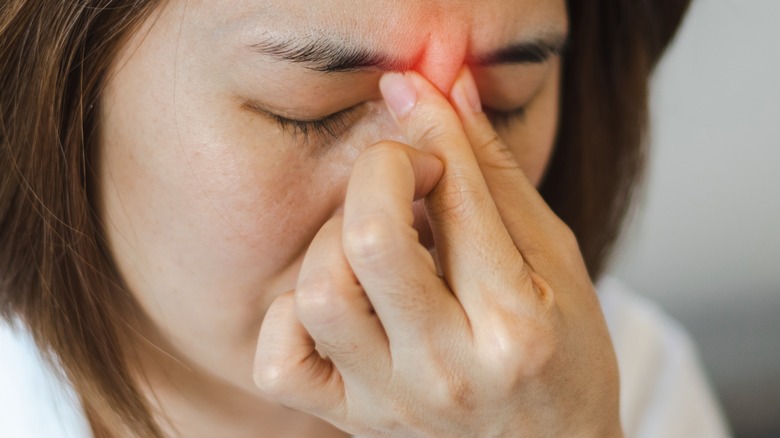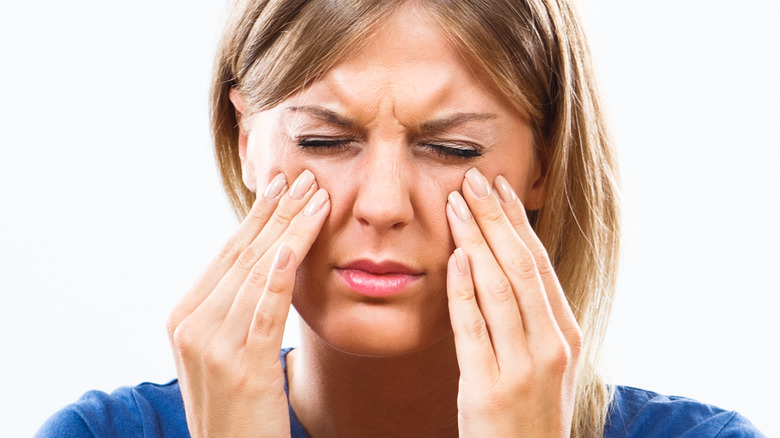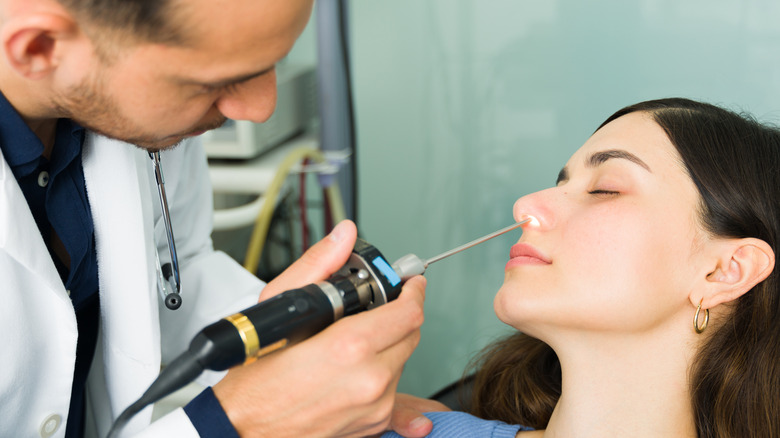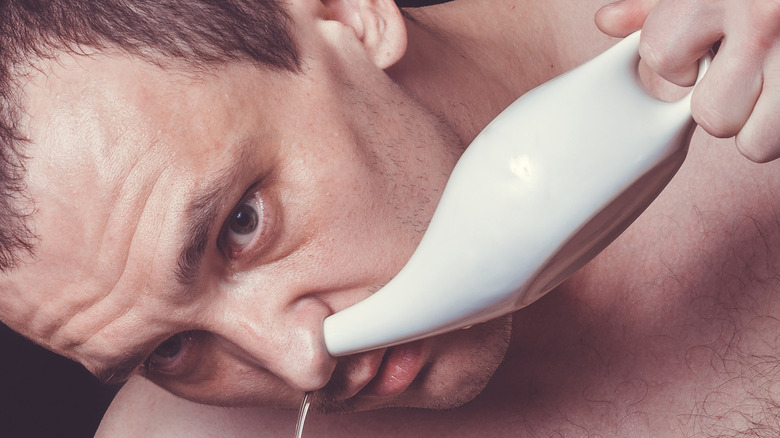Sinus Infections Explained: Causes, Symptoms, And Treatments
Are you exhausted from the pain and pressure caused by your sinus infection? It may be comforting to know you are not alone. Sinus infections, also called sinusitis, are a significant health issue for about 31 million people in the United States annually (via the American College of Allergy, Asthma, and Immunology). These pesky infections, for which Americans spend over a billion dollars each year on pharmaceuticals and over-the-counter medications, account for over 16 million annual doctor visits.
According to Houston Advanced Nose and Sinus, the sinuses are air sacs in the facial bones that surround the cheekbones, forehead, and areas between the eyes. These hollow areas shield the human body by producing mucus to stop airborne microbes, toxins, viruses, and allergies from entering the body.
Sinus infections occur when these air sacs become inflamed, swollen, or have an accumulation of fluid. If the symptoms are not relieved or treated, bacteria or other pathogens can develop, leading to infection (via Healthline). It's essential to understand the typical causes, symptoms, and treatments of sinus infections, and how to manage them if you think you might have one.
There are different types of sinus infections
Chronic sinus infections can be recurrent or continue longer than several months. Meanwhile, acute ones are short-lived, lasting fewer than four weeks. A viral sinus infection is the most common type of sinusitis (via Sinus and Snoring Specialists). Viral infections are usually preceded by a cold or flu, and are characterized by sudden symptom onset, sinus pressure, pain, and clear nasal drainage. Most viral sinus infections resolve within seven days. This type of sinus infection does not necessitate the use of antibiotics; symptoms can be relieved with rest, hydration, over-the-counter medications, and nasal sprays.
Bacterial sinus infections are also common. When your immune system is weakened due to an allergy or viral flare-up, you become more vulnerable to this type of infection. The symptoms of bacterial sinusitis are similar to those of viral sinusitis, but they do not resolve without intervention (via Cedars Sinai). Sinus pressure and pain may worsen as nasal secretions thicken and change to a green or yellow color. Although over-the-counter medications can alleviate symptoms, antibiotics are required to cure this.
On the other hand, fungal sinus infections are frequently caused by severe mold allergies.These infections are rare, but can cause nasal polyps to grow in addition to causing significant swelling in the nose and sinuses. Polyps have the potential to enlarge and obstruct the sinus cavity. Fungal sinus infections may result in subsequent bacterial infections, and need to be treated by your physician (per Sinus and Snoring Specialists).
Allergies and structural abnormalities of the sinus cavity
A variety of reasons may cause sinus infections. You may be more susceptible to developing a sinus infection following a cold or other upper respiratory infection (via MedicineNet). Your sinuses may swell and fill with mucus when you have cold symptoms. If they don't drain well, the mucus acts as a breeding ground for an infection to develop.
Additionally, if you have seasonal allergies or allergies year-round, you should know that you are at higher risk of chronic sinus infections. As a result of allergens that your body does not tolerate, inflammation in the sinuses can become chronic, making you more susceptible to sinus infections. You should consult an allergist if you experience symptoms several months out of the year or if your allergies affect your daily activities. An allergist can help control symptoms leading to chronic sinus infections and other health concerns (via the American College of Allergy, Asthma, and Immunology).
ENT surgeon Dr. Rubinstein (via the Hudson Valley Sinus Center) outlines how other factors can contribute to sinus infections, including your body's anatomy and nasal passage structure abnormalities. Your doctor may examine you for conditions such as a deviated septum or a nasal passage abnormality that can prevent your sinuses from draining properly. Nasal polyps and bone spurs are also chronic abnormalities that may develop and cause chronic sinus infections. Surgical intervention may be required if obstructions are determined to be the source of your chronic sinus infections.
Symptoms you should know
There are certain symptoms that can help you determine if you have a sinus infection. One of the first signs of a sinus infection is pain or pressure on your face (via the Mayo Clinic). The most painful area will be around your eyes or the bridge of your nose. Mucus will clog your nasal passages and prevent proper drainage, causing sinus pressure. As a result, you may develop a sinus headache. Sinus headaches and pressure may feel more intense with movement, such as bending over or lying down (per WebMD). Additionally, you may experience postnasal drip, which can cause a painful throat from the discharge and a subsequent cough (an attempt by your body to expel mucus).
Don't be alarmed if you experience upper jaw pain or feel like you have a toothache — these are typical but odd symptoms of sinus infections. Fatigue, foul breath, ear pain, and possibly a low-grade fever are additional common symptoms. According to another Mayo Clinic article, if your fever or other symptoms continue for more than a few days, you should see a doctor.
Smoking can increase your risk of sinus infections
The primary function of your nose and sinuses is to protect your body from potentially harmful irritants and germs. Your sinus cavities and nose have a protective lining that includes tiny hair-like projections that help trap harmful germs from entering the rest of your respiratory system. When you smoke, your body's cilia, or hair-like protectors, stop working, and your body loses its ability to protect you from airborne pathogens (via Everyday Health).
Smoking damages the cilia responsible for moving the mucus to the back of your throat and out of your sinus tract, where it is swallowed. When the cilia are damaged by smoking, the mucus can build up in the sinus cavities and make you more prone to a sinus infection.
Because cigarette chemicals like hydrogen cyanide and ammonia damage cilia, smoking is as hazardous for your sinuses as it is for your lungs (via Mass Eye and Ear). For individuals who stop smoking, though, there is some good news. A study published in 2017 found that individuals with chronic sinusitis will have symptom improvement over the course of about ten years after quitting.
Can blowing your nose too hard increase your risk of developing a sinus infection?
The idea that you might have been blowing it incorrectly all this time seems a little far-fetched. After all, it's something you probably learned as a child. Surely, there can't be a right or wrong way to do it. What does it matter if your ultimate objective is to get rid of mucus?
That said, there actually is a "wrong" way to blow your nose. According to Dr. Shawn Nasseri, an ear, nose, and throat specialist, a strong blow or even a sneeze can damage your middle ears by pushing mucus backward (via Well+Good). When the mucus is forced back into your sinus cavities, you are more likely to develop a sinus infection. Plus, according to a study published in Clinical Infectious Diseases, forceful blowing can cause blood vessels to rupture, resulting in nose bleeds.
In order to avoid complications, there is a safe way to blow your nose. Consider blowing through one nostril at a time while plugging the other. This ensures that less force is used, and the pressure produced in the sinus cavity is reduced to prevent a sinus infection (via Men's Health).
How do you know if your symptoms are caused by a sinus infection, cold, flu or allergies?
Initially, It can be challenging to tell if you have a cold, flu, allergies, or a sinus infection. These conditions can cause similar symptoms, but their onset and durations vary.
A common cold usually does not cause fever, and cold symptoms develop gradually over several days, generally decreasing after about a week (via the University of Maryland Medical System). However, if your symptoms persist for more than a week without improvement, you are most likely developing a sinus infection related to the cold. The flu, on the other hand, has a sudden onset. You might feel fine at first, but by the end of the day, you might feel like you were hit by a truck. The flu can cause body aches and fever, which a cold or allergies typically do not.
Finally, allergy symptoms do not appear in the same way as other illnesses. Allergy symptoms are more consistent, and may vary depending on the season or exposure to an allergen to which your body is hypersensitive (via MedStar Health). Allergies may cause itchy eyes, throat, and nose. However, if your symptoms are not alleviated or worsen after several days, you should see your doctor.
Are sinus infections contagious?
It is unknown whether all sinus infections are contagious. It all depends on what caused the infection to begin with.
If your sinus infection is accompanied by a cough or sneezing, the pathogen that caused the sinus infection may be spread and cause symptoms in others, such as a cold. If you know your sinus infection is viral, avoiding being around other people is best, as viral infections are contagious (via Tufts Medical Center Community Care). Some sinus infections, however, are caused by conditions that should not be contagious to others, such as nasal polyps, a deviated septum, allergies, or even long-term pollution exposure (per WebMD). These conditions, if left untreated, can lead to sinus infections.
Avoid contact with other people if you're unsure of the cause of your sinus infection, in order to prevent spreading your illness. If you are contagious, covering your nose and mouth when coughing or sneezing and frequently washing your hands or using hand sanitizer is the best way to reduce transmission.
How is a sinus infection diagnosed?
As WebMD states, it's important to visit your doctor for a diagnosis and treatment plan if your sinus symptoms persist or worsen over time. Your doctor will inquire about your symptoms and when they started. They may want to know if your symptoms have worsened or stayed the same. A physical exam will be performed, and your doctor will examine your ears, nose, and throat to look for irritation and signs of infection. If your doctor is unsure or if you have a chronic sinus problem, your doctor may refer you to a specialist for further evaluation.
An ear, nose, and throat (ENT) doctor may examine your nose with a light or a small scope. They may order additional tests such as X-rays or a sinus CT scan if they notice an abnormality, such as polyps or other structural defects. Very rarely will lab tests or nasal cultures be necessary (via Verywell Health).
Treatment for sinus infections
According to the Mayo Clinic, most sinusitis cases resolve on their own. If a viral infection is the source of your sinus problems, your doctor would probably advise over-the-counter medication. Nasal sprays are among the most frequently recommended remedies for sinus issues. Nasal sprays come in various forms, including saline, decongestant, and corticosteroid formulations. Your doctor will suggest the best option for your condition. Antihistamines, oral decongestants, cold medications, and pain relievers, such as acetaminophen, or ibuprofen, are other typical therapies.
You will likely need to see an allergist if your sinus infections are persistent and it is determined that allergies are to blame (via the American Sinus Institute). The allergist may suggest immunotherapy (allergy shots) to address your symptoms.
It is not a good idea to immediately turn to antibiotics, as they can be costly, come with risks, and may even cease to be effective with overuse (per Choosing Wisely). However, your doctor could think about recommending antibiotics if the infection is caused by bacteria and does not go away on its own. Make sure to finish all the prescription medication if that is the suggested course of treatment.
What complications are associated with untreated sinus infections?
Serious complications from sinus infections are uncommon. You should revisit your doctor if your symptoms do not disappear or worsen after a few days. A 2015 study published in Autopsy Case Reports claims that untreated bacterial sinusitis can become severe with escalating symptoms. Following up with your doctor after your antibiotic treatment is finished is essential, especially if symptoms have not improved or if you or your child are being treated for bacterial sinusitis.
Meningitis, brain abscess, bone infections, blood clots, and orbital cellulitis — an infection that spreads from the sinuses to the eye — are all rare complications of bacterial sinusitis (via Medical News Today). Despite their rarity, they can happen if ignored symptoms get worse. You need to be aware of the signs these issues can cause, including redness, pain, or swelling of the eye that may cause visual difficulties, confusion, severe headaches, or difficulty or stiffness moving your neck forward.
Are antibiotics over-prescribed for sinus infections?
Many sinus infections resolve on their own within 15 days without the need for prescribed antibiotics, according to a clinical practice study published by The New England Journal of Medicine. Even though research has confirmed this, most doctors still prescribe antibiotics up to 91% of the time a patient is treated in an office or emergency room.
In addition to patient expectations regarding antibiotic therapy and a discrepancy between clinical recommendations and current antibiotic prescribing trends, antibiotics might be overprescribed. Since it is frequently unclear whether viral or bacterial infections are the cause or whether a secondary bacterial infection may be developing, many clinicians are moving toward a shared decision-making model with their patients and a wait-and-see strategy (via the Centers for Disease Control and Prevention). This strategy may include your doctor calling you back in a few days or ordering an antibiotic but asking you to wait two to three days before taking it if your symptoms don't get better.
Following your doctor's recommendations is crucial because overusing antibiotics can negatively affect your health (via Verywell Health). There can be possible adverse side effects and the potential to develop antibiotic resistance. Not to mention, they won't benefit you if you don't need them.
Home remedies: do they work?
Sinus infections are excruciatingly painful. There are, however, effective natural and home remedies that can be used to alleviate the pain and discomfort associated with sinus problems. One such solution is nasal irrigation, such as a Neti pot. Nasal irrigation comes in a variety of forms. Dr. David Rabago of UW Health has been researching the benefits of nasal irrigation for over 15 years. When the sinuses are congested, he recommends cleansing them daily to help relieve symptoms and reduce the need for antibiotics. Daily irrigation is equally important for chronic sinus patients to reduce bothersome symptoms and enhance their quality of life.
Another important factor in alleviating symptoms is keeping your sinuses moist (via Healthline). Humidity, plenty of fluids, and steam can all help clear your sinuses. You can improve your breathing and sleep better by sitting in a steamy bathroom or using a humidifier at night.
You might also think about avoiding specific foods when your sinuses are inflamed. According to another Healthline article, dairy, processed foods, and diets high in sugar might worsen your symptoms by causing more inflammation.
Can sinus infections be prevented?
While there is no guarantee that you can prevent a sinus infection, you can take steps to reduce your chances of getting one. The CDC estimates that community education alone can reduce the prevalence of respiratory disease by about 21%.
Handwashing is the simplest and most effective way to stay healthy. We all touch many more objects and surfaces than you can imagine. These surfaces are home to germs that cannot be seen with the naked eye. As a general guideline, wash your hands or use hand sanitizer before touching your face, eating, drinking, using the restroom, or anytime you need a quick refresh (via the Centers for Disease Control and Prevention). Other preventative measures include limiting your exposure to secondhand smoke and considering quitting if you smoke cigarettes or other products.
Furthermore, if allergies are causing your sinus problems, visiting an allergist can help prevent flare-ups (per Healthline).
When to see a doctor
Although most sinus infections can be treated without the assistance of a doctor, there are times when you should consult one. You know your body better than anyone else, and are always your best health advocate. You should seek medical attention whenever you are uncomfortable with any symptom.
Furthermore, you should see a doctor if your symptoms worsen or have persisted for more than ten days without responding to over-the-counter medications or home remedies (via the Mayo Clinic). Additionally, if you have underlying asthma or other concerns that affect your breathing, you should be vigilant about receiving medical care. A follow-up visit is advised if you do not feel better after seeing your doctor.
Finally, you should see your doctor if you experience having a fever of more than 100.4 degrees Fahrenheit that persists for several days and is not relieved by fever-reducing medications (via Healthline). A chronic condition could be the culprit, or your doctor may need to adjust your treatment plan.















